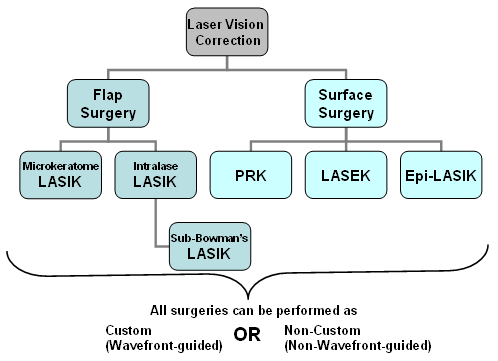Frequently Asked Questions About Lasik Eye Surgery

Posted by-Skou Bentzen
Prior to LASIK, your eye doctor will certainly test your vision to see to it it is stable. She or he will also examine to see if you have any other eye troubles that could affect your outcomes.
After the eye doctor has actually applied numbing eye decreases, she or he will certainly create a paper-thin flap in your cornea tissue making use of a gadget called a microkeratome or laser. The treatment is pain-free.
What Is LASIK?
LASIK is a kind of refractive surgery. It deals with vision issues brought on by refractive mistakes, which occur when the cornea or lens do not appropriately bend light rays.
Most individuals that have LASIK accomplish great distance vision without glasses or get in touches with. However, they may require analysis glasses to see close. The results of LASIK are permanent, although aesthetic negative effects are temporary.
Can I Have LASIK if I Have Astigmatism?
Fuzzy vision is frequently caused by astigmatism. LASIK can aid with this problem by making your cornea a lot more balanced. The cosmetic surgeon will utilize a device called a microkeratome or laser to cut a thin flap in your cornea, then fold it back. They will certainly then utilize a laser to improve the cornea so it can flex light far better.
The only thing that LASIK can't do is correct presbyopia (age-related farsightedness). This can only be finished with cataract surgical treatment.
Can I Have LASIK if I Have Dry Eye?
An essential part of the LASIK analysis is checking just how well your eyes generate tears. Some individuals with completely dry eye are incapable to get LASIK since it can worsen the condition.
Dry eye is a common negative effects of LASIK because the treatment cuts corneal nerves. Nonetheless, it normally improves as the eye heals. You can utilize man-made tears as well as punctal plugs to handle your signs and symptoms.
Can I Have LASIK if I Have a Cataract?
In most cases, yes. LASIK can enhance your vision after cataract surgery.
When you have a cataract, your lens is cloudy and your close-up vision is fuzzy. LASIK can help with this, along with your distance vision.
During LASIK, your surgeon will utilize a laser or a blade to develop a thin flap on your cornea. Then the specialist will fold the flap back and make use of a laser to reshape your cornea.
Can I Have LASIK if I Have a Retinal Detachment?
Retinal detachment normally arises from a retinal tear. The physician will repair the tear with an in-office procedure called pneumatically-driven retinopexy. After the eye is numbed, the medical professional inserts an expanding gas bubble right into the eye to push the separated retina versus its support tissue.
LASIK doesn't right presbyopia, which develops as you age as well as causes blurred close-up vision. However, it can be integrated with mono-vision to decrease or eliminate the demand for reviewing glasses.
Can I Have LASIK if I Have a Hyperopia (Farsightedness) or Myopia (Nearsightedness)?
Many health insurance business do not cover LASIK since it isn't considered medically necessary. Nonetheless, they may reimburse people for lens implants if a specialist is part of their network.
Before https://www.verywellhealth.com/cataract-surgery-cost-5114477 go through LASIK, your ophthalmologist will certainly carry out a comprehensive eye exam. This will consist of examining your total eye health and wellness, student dimension and also refractive mistake. He or she will additionally gauge the density of your corneas.
Can I Have LASIK if I Have Presbyopia (Aging Eyes)?
LASIK does not resolve presbyopia (loss of near vision related to age). Instead, it corrects refractive errors by improving the cornea.
After numbing decreases and also covering the eye with a shield or spot, the doctor produces the flap. Then the laser improves the cornea. You may hear a clicking audio as well as smell an unusual fragrance. This is regular and does not trigger damage.
Can I Have LASIK if I Have Keratoconus (Bent Cornea)?
In LASIK, your cosmetic surgeon will use a femtosecond laser to reduce a slim flap in the cornea. They will then fold it back and use a various laser to improve your cornea.
Your vision is based upon just how light enters your eye, bends via the lens and focuses on the retina. https://www.dailystrength.org/journals/lasik-eye-surgical-treatment-recovery-what-to-anticipate-and-how maintain light from focusing appropriately and also trigger blurred vision.
Can I Have LASIK if I Have Blepharitis (Swelling of the Eyelids)?
A lot of clients select LASIK because they desire freedom from glasses or contact lenses. It is important to discuss your goals with your ophthalmologist before having the procedure.
LASIK is not excruciating. https://zenwriting.net/stacey7vance/typical-misconceptions-about-lasik-eye-surgery-debunked are positioned to numb your eyes before the surgery. A lot of patients explain really feeling a minor stress however no discomfort. Healing from LASIK is reasonably quick. Your vision will be a little blurred and also light sensitive right after surgical treatment but should enhance swiftly.
Can I Have LASIK if I Have a Corneal Thickness Problem?
LASIK fixes vision by reshaping the corneal tissue. To do this, the cornea needs to be thick enough for the surgeon to develop a flap.
If your corneas are as well thin, you may be a candidate for laser vision improvement procedures that do not call for creating a flap, such as PRK or Epi-LASIK. These treatments have similar results to LASIK but work in a various method.

